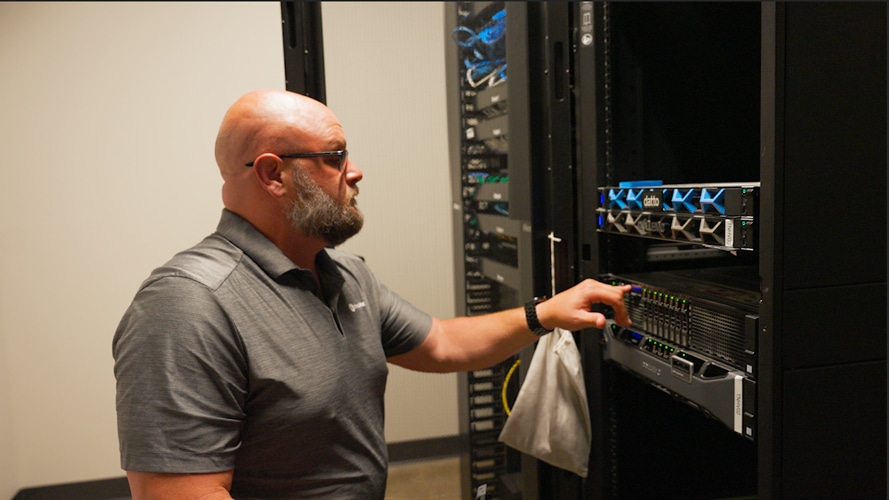In an ever-changing technology landscape, organizations are continually faced with decisions that could significantly impact their data security and operational integrity. One such decision is whether to opt for a cloud hosted server solution or to maintain them locally. Your managed IT services provider will be a great resource in helping you figure out what’s right for you.
The choice between these environments is critical and often boils down to various factors, including cost, scalability, and notably, security. This article delves into the cybersecurity aspects of cloud hosted servers compared to local servers, aiming to provide insights into which might be the more secure option and why.

Understanding Cloud Hosted and Local Servers
Before comparing their security, it’s essential to define what each server type entails. A Cloud hosted server is typically provided by a third-party service provider and is accessed over the internet. These are often located in data centers managed by the provider, offering resources on-demand.
On the other hand, a local server refers to on-premises hardware that an organization manages within its physical premises.
Security Considerations
1. Physical Security:
- Cloud Hosted: Data centers offering hosted services prioritize high-level security measures, including biometric access controls, surveillance, and 24/7 monitoring, which might be beyond the financial or logistical reach of many small to medium-sized enterprises (SMEs).
- Local: While organizations can implement their own security protocols, the level of physical security around local servers may not match that of specialized data centers. SMEs might struggle with the costs and complexities of securing physical access to the same extent.
2. Cybersecurity Measures:
- Cloud Hosted Servers: Reputable managed IT services and hosting providers invest heavily in cybersecurity defenses, including firewalls, intrusion detection systems, and regular security audits. They often employ teams of cybersecurity experts to monitor systems and respond to threats. Keep in mind, you still require the same security controls you would have on a local server as the aforementioned controls are mostly physical or require some kind of manual intervention.
- Local Servers: The responsibility for installing, updating, and managing cybersecurity measures falls entirely on the organization or a managed IT service provider. This requires dedicated IT staff and resources to ensure the server is protected against the latest threats, which can be a significant challenge.
3. Data Redundancy and Backup:
- Cloud Hosted Servers: Most hosting services offer robust data backup and redundancy plans, ensuring data is replicated across multiple locations. Often, your managed IT services company will offer additional protections. This minimizes the risk of data loss due to hardware failure, natural disasters, or cyberattacks.
- Local Servers: Implementing a comprehensive backup and redundancy strategy for local servers can be expensive and complex. Organizations or outsourced IT services must actively manage their backup systems and ensure they are regularly updated.
4. Compliance and Regulations:
- Cloud Hosted Servers: Hosting providers often comply with various international and industry-specific security standards and regulations, which can help organizations meet their compliance requirements more easily.
- Local Servers: Organizations are solely responsible for ensuring their server and data handling practices comply with relevant laws and standards, which can be both challenging and resource-intensive.
The Server Verdict
Determining whether a cloud hosted server is more secure than a local server is not straightforward. Cloud hosted servers often offer higher levels of physical security, advanced cybersecurity measures managed by experts, and superior data redundancy capabilities. They can provide a level of security that might be unattainable for SMEs on their own. However, the trade-off includes potentially less control over data and reliance on a third party’s security practices.
Conversely, local servers offer complete control over data and security measures, which could be pivotal for organizations with highly sensitive data or unique compliance needs. Yet, the onus is on the organization to ensure the security measures are sufficiently robust and constantly updated.
The choice between cloud hosted and local servers should be guided by an organization’s specific security needs, resources, and capabilities. Contact your managed IT services company to find out what’s right for you.
For many, the managed security services of cloud hosted solutions offer a compelling case, especially when in-house resources are limited. However, for organizations with the capability to invest in and manage sophisticated security measures, local servers might provide the tailored security posture they require. Ultimately, a thorough risk assessment and understanding of each option’s security implications are essential in making an informed decision.

Chris Montgomery
ThrottleNet Sales Director
cmontgomery@throttlenet.com



